
Latest News Regarding
Horn of Africa
AUC Chair Faki calls for Kenya, Somalia dialogue to end tension
AUC Chair Faki calls for Kenya, Somalia dialogue to end tension




Source: theStar Kenya, Tuesday January 26, 2021
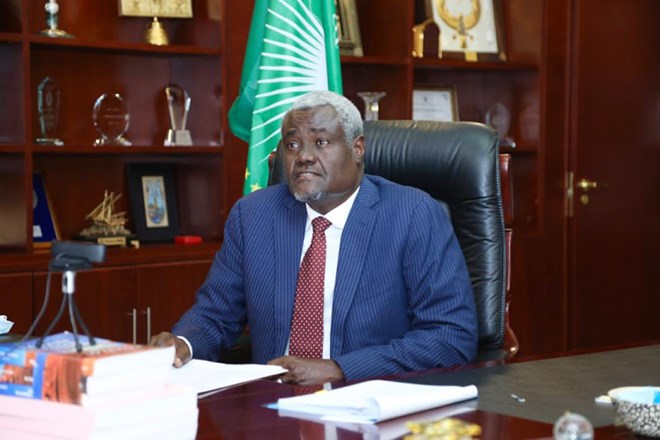
The Chairperson of the African Union Commission (AUC) has said that peace on the Kenya-Somalia border is vital to regional stability.
Moussa Faki, through a post on his Twitter account on Tuesday morning, said that he is following the tensions on the two neighbouring countries with concern.
The AUC chair has urged both the governments of Kenya and Somalia to exercise restraint and engage in dialogue in conformity with the Intergovernmental Authority on Development (IGAD) led process.
“I’m following the tensions on the Kenya-Somalia border with concern, and urge the two neighbours to exercise restraint and engage in dialogue in conformity with the IGAD-led process,” Faki said.
On Monday, the government of Somalia alleged that the armed militia armed by the government of Kenya crossed the border into its territory on Sunday night and attacked the Gedo, district of Beled Xaawo.
“The Federal Government of Somalia strongly condemns this illegal aggression orchestrated and planned within Kenya. These actions are an affront to the peaceful coexistence of international norms of mutual respect, territorial integrity and national sovereignty,” the Somalia government said in a statement.
The Kenyan Government through Interior CS Fred Matiang’i denied any cause of alarm between Kenya and Somalia, saying that the government has put in place enough security forces to protects its people following the tension caused by the inside war between Somalia and Somaliland.
Kenya’s Inspector General of Police Hillary Mutyambi had also said that there is no need to raise alarm, adding the country is secured.
At least 12 people were injured in a renewed fighting between Somalia National Army and Jubaland security forces at the neighbouring Bulahawa town on Monday, even as Kenyan government claimed that the security had been heightened.
Kenya had expressed concern over the fighting in a Diplomatic Note to the Chairperson African Union Commission.
The town of Bula Hawa is a few kilometres from the Kenya-Somalia border.
In December 2020, President Uhuru Kenyatta attended Igad’s meeting in Djibouti with hopes of resolving the Kenya-Somalia spat.
The meeting was also attended by Somalia’s Mohamed Farmajo, Sudan Prime Minister Abdalla Hamdok, who is the Igad chairman, and Faki.
Igad is a body comprising seven countries in the Horn of Africa. The regional organisation based in Djibouti supports its member states in their development efforts, especially in the areas of peace processes and food security.
Somali gov’t says it intercepted weapons from Kenya-backed bandits
Somali gov’t says it intercepted weapons from Kenya-backed bandits




Source: Hiiraan Online, Monday January 25, 2021
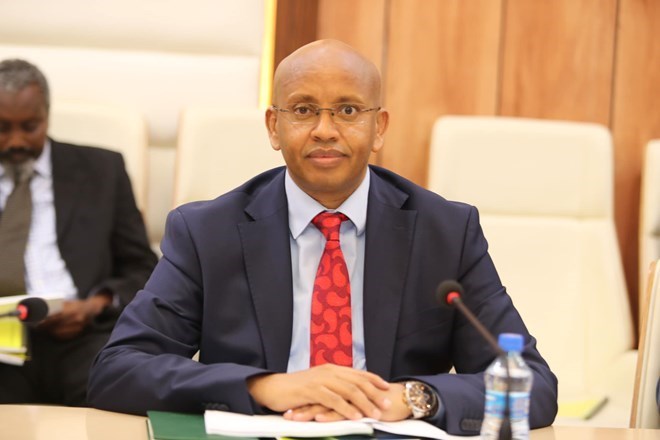
Mogadishu (HOL) – The Federal Government of Somalia strongly condemned what it described as an act of aggression from Kenya-backed bandits for their attempt to smuggle weapons inside Somalia.
The Ministry of Information released a statement on Monday where they accused the Kenya-backed fighters of crossing into the Somali territory of Beled Hawo located in the Gedo region.
Osman Abukar Dubbe, Somalia’s information minister, said that the fighters were met by Somali security forces who successfully repelled the attack.”Tonight, Kenya supported pundit [sic] attacked Beled Hawo District of Gedo region. Our Somali National Army heroes defended the city and its civilian population. We strongly condemn these attacks which are against regional stability and all international norms and laws.”
In an English version of a similar press release, the Somali government did not mention Kenya by name but referred to “foreign entities.”
“It has come to the attention of the Federal Government of Somalia that Somali & foreign entities have attempted to illegally import high calibre weapons and ammunition into the Federal Republic of Somalia without the knowledge and permission of the Federal Republic of Somalia.”
The statement went on to say that the actions could have destabilizing consequences in the region and that it would be conducting an investigation into the origin and motives of the intercepted weapons.
The press release was not accompanied with a photo handout of the captured weapons cache.
Tensions in Somalia’s Gedo region remain high, where the Federal Government has deployed at least 700, Turkish-trained troops. Jubbaland’s regional government strongly condemned the move as an incursion and has refused to partake in the federal election process until those troops are removed. Meanwhile, Mogadishu insists that the soldiers must remain there to defend Somalia’s borders. Relations further soured following the high-profile jailbreak of a Jubaland regional security minister. Abdirashid Janan – who the Somali government claims spearheaded the most recent attack – escaped a Mogadishu jail and fled to Kismayo and then to Nairobi, Kenya.
Kenya writes to AU over Bula Hawa fight between Somalia forces
Kenya writes to AU over Bula Hawa fight between Somalia forces




Source: Daily Nation, Kenya, Monday January 25, 2021
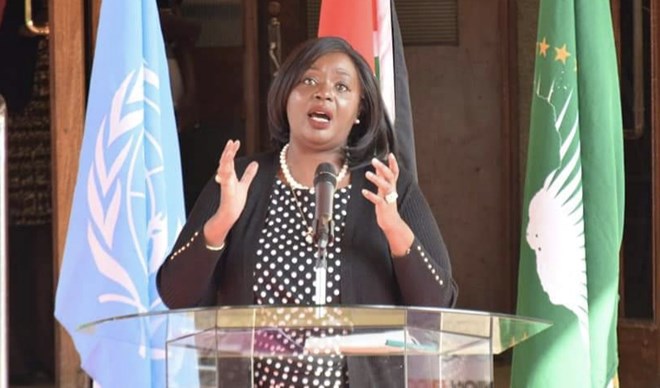
Kenya on Monday wrote to the African Union (AU), raising security concerns after Somalia’s federal and regional forces renewed fighting at Bula Hawa in Gedo near Mandera County.
Nairobi said the fighting is likely to create a security crisis for Kenya, especially since the two countries no longer have diplomatic relations.
“Kenya’s primary concern is that the renewed fighting engenders large-scale displacement of civilians inside Somalia and increasingly generates large numbers of refugees and asylum seekers to Kenya, therefore aggravating the already dire humanitarian situation in Somalia and in the refugee camps in Kenya,” said a statement from the Ministry of Foreign Affairs.
“Kenya is concerned that if the fighting continues unabated, the situation could further destabilise the region, complicate the security situation and reverse gains made in the fight against terrorism.”
Following the fighting, government offices and business premises in Mandera town remained closed for the better part of the day.
Women and children were seen fleeing towards the Kenya-Ethiopia border and later crossing into Suftu for safety.
“I cannot wait to die. I am going to Ethiopia with my children until the situation normalises,” said Ms Halima Alio.
Jubbaland minister
Kenya’s letter came after normal business was disrupted in Mandera town for the better part of Monday as two rival Somalia military forces fought on the Somalia side.
The two forces began their battle at about 1am, with the fight going on throughout the day.
Soldiers of the Federal Government of Somalia (FGS) have been camping at Bula Hawa town since last March after uprooting Jubbaland forces loyal to Abdirashid Hassan Abdinur alias Abdirashid Janan.
Mr Abdirashid Janan is a Jubbaland minister for Security who is wanted by Mogadishu.
After being overpowered in March, Mr Janan and his army crossed into Kenya, finding a hiding place in Mandera town.
Since then, he has been planning to recapture Bula Hawa, a town neighbouring Mandera.
The wanted minister, now declared a fugitive, has been reinforcing his team and getting more weaponry from Kismayu.
Kenya accused
On Monday morning, Somalia’s Information Minister Abukar Dubbe claimed Mogadishu blocked illegal importation of weapons by some “local and foreign entities”.
The Somali version of his statement, however, accused Kenya of siding with Janan’s rebels.
“Kenyan troops and rebels attacked Bula Hawa (Beled Hawo) in the middle of the night as they crossed the border to seize the key town, which is damaging to the sovereignty of our country. Nearly 100 prisoners (of war) have been captured in the fighting, and they have been defeated.”
Somalia made similar claims two weeks ago to a delegation nominated by Djibouti President Ismael Guelleh to help iron out a tiff between Kenya and Somalia.
However, Somali authorities did not take the delegation to Gedo, the alleged location of militia camps said to be supported by Kenya.
Instead, Kenya rejected the claims and showed the delegation satellite images of Somalia’s military deployment closer to the border with Kenya — as close as 20 metres away.
Nairobi told the delegation that Somalia’s forces were provoking it but argued the tiff between Jubbaland and the Somali National Forces is a Somalia issue.
During the separate sessions, it also emerged that Somalia’s forces had quietly compensated a family in Mandera, whose member was shot by a stray bullet following an earlier clash.
In November 2020, Mogadishu accused Nairobi of hosting, training and arming a militia group with the aim of disrupting business back home.
Nairobi chose not to respond to the allegations as Mogadishu sent more military forces and set up camps along the common border.
KDF role
A security officer in Mandera told the Nation that by 5am, the Jubbaland forces had managed to push the FGS forces out of Bula Hawa.
“The fight is in Somalia … we have nothing to do with it. The Jubbaland forces are recapturing Bula Hawa town and it looks like they have covered some ground,” the source said.
Soldiers of the Kenya Defence Forces (KDF) were seen strategically positioned in Mandera town, ready to respond to any spillover of the fighting into Kenya.
It remained unclear whether they participated in the fighting at Bula Hawa but they were seen patrolling the border.
It was also the KDF that took injured Jubbaland officers to Mandera County Referral Hospital.
By 11am Monday, the facility had received at least five injured persons, including three Jubbaland military officers.
The KDF officers also guarded government offices and residences of senior civil servants.
Communication networks in Mandera were cut off at about 1pm Sunday.
UAE opens kidney dialysis centre in Hargeisa, Somaliland
UAE opens kidney dialysis centre in Hargeisa, Somaliland




Source: gulfnews.com, By Tawfiq Nasrallah
Sunday January 24, 2021
The facility will benefit more than 30 patients per day

Khalifa bin Zayed Al Nahyan Foundation hospitals in Somaliland
Hargeisa: A delegation from the Khalifa bin Zayed Al Nahyan Foundation has opened a kidney dialysis centre in Somaliland for the benefit of more than 30 patients per day.
The move comes in line with the directives of President His Highness Sheikh Khalifa bin Zayed Al Nahyan, and the support of His Highness Sheikh Mohammed bin Zayed Al Nahyan, Crown Prince of Abu Dhabi and Deputy Supreme Commander of the UAE Armed Forces, and the direct follow up of Sheikh Mansour bin Zayed Al Nahyan, Deputy Prime Minister and Minister of Presidential Affairs and Chairman of the FoundationThe gesture – implemented by the Khalifa bin Zayed Al Nahyan Foundation – is part of the UAE’s humanitarian initiatives to support the fraternal people of Somaliland, especially given the challenges facing the health sector in Somaliland, and in light of the worsening health conditions the world is witnessing during the COVID-19 pandemic and to achieve the overall development in the same time.
The centre in Hargeisa was inaugurated by Abdirahman Saylici, Vice President of Somaliland in the presence of Abdullah Al Naqbi, Director of the State’s Commercial Office in Hargeisa; Engineer Sultan Hassan Al Khafili, the head of the Khalifa Humanitarian Foundation delegation; Omar Ali Abdillahi, Minister of Health of Somaliland, and a number of officials.
Saylici expressed his appreciation for the humanitarian and developmental assistance provided by the UAE to Somaliland that would improve living conditions of the population and enhance the overall development journey of the people of Somaliland, especially in the health sector in the light of the unprecedented circumstances being witnessed globally due to COVID-19 pandemic.
He also thanked the Khalifa Foundation for its charitable initiatives in the country, noting that “the UAE’s humanitarian efforts mirror distinguished relations that bind his country with the UAE.”
Sudan: 250 killed, over 100,000 displaced as violence surges in Darfur
Sudan: 250 killed, over 100,000 displaced as violence surges in Darfur

Source: UN, UNAMID/Mohamad AlmahadyIntercommunal violence in Darfur has left millions in need of assistance. Pictured here, an IDP settlement in Sortoni. (file photo) 22 January 2021Peace and Security
A sharp uptick in intercommunal violence in Sudan’s Darfur region has forced more than 100,000 people to flee their homes in search of safety, including many into neighbouring Chad, the UN refugee agency (UNHCR) reported on Friday.
According to the agency, 250 people – including three humanitarian workers – also lost their lives in the clashes that started on 15 January in West Darfur province, and spread into South Darfur the next day. https://platform.twitter.com/embed/index.html?creatorScreenName=UN_News_Centre&dnt=false&embedId=twitter-widget-0&frame=false&hideCard=false&hideThread=false&id=1352571331271864323&lang=en&origin=https%3A%2F%2Fnews.un.org%2Fen%2Fstory%2F2021%2F01%2F1082722&siteScreenName=UN_News_Centre&theme=light&widgetsVersion=ed20a2b%3A1601588405575&width=550px
Boris Cheshirkov, a UNHCR spokesperson, told journalists at a regular press briefing in Geneva on Friday, that about 3,500 new Sudanese refugees have arrived in eastern Chad.
“These refugees – the majority of them women and children – have been hosted in four very remote locations that lack basic services or public infrastructure, where they have been sheltering under trees,” he said.
“Due to the COVID-19 situation, Chadian local authorities are directing the new arrivals to a transit site, where they will undergo quarantine before being relocated to an existing refugee camp, away from the border,” the UNHCR spokesperson added.
He said that the UN agency is rushing supplies to the area to respond to their needs, as well as mobilizing resources as part of an inter-agency response.
‘Break the cycle of violence’
Authorities in the region have been attempting to contain the situation and have deployed security forces to the area but “severe gaps” in protection remain, according to the UN human rights office.
However, an “imminent risk” of further violence remains, in an environment “where decades-old ethnic and tribal tensions that were further stoked by the previous regime continue to fester”, OHCHR spokesperson Ravina Shamdasani said at the same briefing.
There are reports that local health facilities are unable to cope with the high number of casualties, she added.
Ms. Shamdasani called on the Government of Sudan to protect of civilians as well as restore public order and the rule of law in Darfur.
She also called for thorough and effective investigations into the violence to bring the perpetrators to justice and “to break the cycle of armed citizens taking the law into their own hands to avenge attacks on members of their communities.”
10 children killed
At least 10 children are among the dead, said Abdullah Fadil, UN Children’s Fund UNICEF‘s Representative in Sudan, in a statement issued on Friday, the youngest under five years old.
“Too many lives lost. Too many young futures cut short. UNICEF appeals to the tribal leaders in the area, to the young people and to tribes in west Darfur to stop fighting”, hs said. “We must finally address the long-term root causes of conflict, and lay the foundations for lasting peace.
“I served in El-Geneina between 2009 and 2010. It pains me that 10 years on, the level of violence in the streets of this beautiful city is only escalating.”
A vast, strife-torn region
Darfur, a vast region roughly the size of Spain and plagued by violence for years, was the site of a United Nations-African Union hybrid peacekeeping mission (UNAMID) that was deployed to protect civilians, facilitate aid delivery, and support efforts to address root causes of the conflict.
The mandate of UNAMID ended last year and it ceased operations on 31 December 2020, roughly two weeks before the latest round of violence.
The mission is currently drawing down, a process that includes repatriation of troops, their vehicles and other equipment; the separation of civilian staff; and the closure of its offices.
Eritrean Refugees in Ethiopia’s Tigray Region
Eritrean Refugees in Ethiopia’s Tigray Region
Source: UN News posted on 19 January 2021 a news item titled “‘Swift Action’ Needed in Tigray to Save Thousands at Risk, UNHCR Warns.”
Two months after conflict forced humanitarian workers to withdraw from Ethiopia’s Tigray Region, the UN refugee agency (UNHCR) reported that tens of thousands of Eritrean refugees have been cut off from supplies and assistance and urgently need assistance0 commentsLabels: Eritrea, Ethiopia, human rights, humanitarian access, refugees, Tigray Region, TPLF, UNHCR, WFP
Could a National Dialogue Solve Ethiopia’s Political Crisis?
Could a National Dialogue Solve Ethiopia’s Political Crisis?
Source: The United States Institute of Peace published on 19 January 2021 a discussion titled “Could a National Dialogue Solve Ethiopia’s Political Crisis?” with Emebet Getachew, Life and Peace Institute in Addis Ababa, Mehari Taddele Maru, European University Institute in Florence, Italy, and Yohannes Gedamu, Georgia Gwinnett College in Lawrenceville, Georgia.
While the authors admit that a national dialogue may not solve Ethiopia’s political crisis, they believe it is a good starting point and has the potential to address the country’s dilemmas. 0 commentsLabels: Abiy Ahmed, elections, Ethiopia, federalism, freedom of the press, national dialogue, TPLF
WHO: Poorer nations to get first 40 million vaccines next month
WHO: Poorer nations to get first 40 million vaccines next month




Source: DW, Saturday January 23, 2021
WHO chief Tedros Adhanom Ghebreyesus: Future brighter but “we still have a lot of work to do:”
Pfizer-BioNTech will ship the first 40 million coronavirus vaccines to poorer nations next month. The WHO’s COVAX scheme is aimed at 20% of vulnerable populations this year.
World Health Organization chief Tedros Adhanom Ghebreyesus said his UN agency’s COVAX scheme had reached a deal with vaccine maker Pfizer-BioNTech for 40 million doses for poorer countries.
Another 150 million doses of AstraZeneca’s vaccine will come in the first quarter of 2021 under COVAX — assuming WHO safety clearance, said Seth Berkley, chief executive of the private-public vaccination fund GAVI. a press conference in Geneva, UN agency head Tedros added that fresh US “commitment” under new President Joe Biden to join COVAX meant “that we are closer to fulfilling” the scheme’s promise.
Launched last year before vaccines became readily available, COVAX’ initial aim is to immunize the most vulnerable 20% of poorer coronavirus-threatened nations. Earlier this week, Tedros blasted rich countries over hoarding.
Not-for-profit basis
Pfizer chairman Albert Bourla told the virtual Geneva conference that the initial dispatch would be on a not-for-profit basis, adding developing countries should have “the same access to vaccines as the rest of the world.”
The Geneva announcements come as wealthy countries inoculate millions, some using shots procured under bilateral deals, decried officially, for example, by the EU.
Asked how many vaccine doses all manufacturers might produce this year, GAVI’s Berkley said: “I think we’re talking about numbers in the range of six to seven billion doses.”
Chinese and Russian vaccines, if proven safe and efficacious, could also be added to COVAX, Berkley added.
“We still have a lot of work to do,” said WHO head Tedros, “but the light at the end of the tunnel continues to grow brighter.”
Morocco takes delivery
On Thursday, Anthony Fauci, chief medical adviser to US President Biden, said the USA would join COVAX, reversing ex-president Donald Trump’s policy.
Morocco on Friday received 2 million AstraZeneca doses, arriving on a Royal Air Maroc flight from India, whose serum institute (SII) has started exporting that vaccine, developed in conjunction with Britain’s Oxford University.
Morocco’s health ministry said Rabat also expected on January 27 to receive a Chinese Sinopharm delivery.
The ministry said 3,000 vaccine locations were prepared to initially vaccinate health workers, teachers, the elderly and public officials in areas with higher infections.
Fundamental Rights Platform looks to ways forward to make human rights work in challenging times
Fundamental Rights Platform looks to ways forward to make human rights work in challenging times
Rights areas:
Source: European Agency for Foundational Rights, When: 01 February 2021 Fundamental Rights Platform External event
On 1 February, the Fundamental Rights Platform (FRP) meeting will provide an online platform for civil society organisations to connect with FRA experts, policy-makers and international organisations. They will discuss solutions to the most pressing human rights concerns experienced by civil society across the EU.
It will offer a space to exchange ideas, experiences and good practices developed by civil society in the context of the current pandemic. They will formulate their needs towards policy-makers and share them with the high-level panel that will consist of the EU Equality Commissioner, Helena Dalli, UN Special Rapporteur on the situation of human rights defenders, Mary Lawlor, and FRA Director Michael O’Flaherty.
Proposed US Policy for Somalia
Proposed US Policy for Somalia
Source: The Foreign Policy Research Institute published on 12 January 2021 an analysis titled “The Way Forward for the United States in Somalia” by Stephen M. Schwartz, former US ambassador to Somalia.
The author recommends, among other proposals, that the Biden administration reverse the Trump administration’s decision to withdraw almost all US forces from Somalia.
Somalia: EU begins €14.7M livestock, fisheries project50
Somalia: EU begins €14.7M livestock, fisheries project50




Source: Anadolu Agency, Thursday January 21, 2021
It aims to expand Somali economy, improve lives of farmers, says EU ambassador

Image Credit Twitter
MOGADISHU, Somalia— The EU on Wednesday launched a fisheries and livestock project to expand the Somali economy and improve the lives of farmers.
Speaking during the launch ceremony in the capital Mogadishu, Nicolas Berlanga Martínez, the EU ambassador to Somalia, said the 14.7 million euro ($17.7 million) project is aimed at revitalizing the Somali economy, promote livelihood opportunities, create jobs and support inclusive growth where no one is left behind.“It addresses the need for implementing a comprehensive and integrated approach to Somalia’s development, and contributes to stability by supporting four critical processes: stabilization, governance, economic growth and social protection,” he added.
The Resilient Fisheries and Livestock Value Chain for Inclusive and Sustainable Growth project’s focus is on access to markets for farmers, quality production of livestock and fish, and institution-building.
“Enhancing the livestock and fisheries sectors of Somalia will not only create much-needed jobs, but will also strengthen cooperation between the federal government and federal member states,” the EU official said.
Majority of Somalis rely on livestock and fishing industries for their livelihoods. The use of outdated farming methods limits the full potential that can be harnessed through innovative technologies.
President Biden reverses Trump’s travel ban targeting Muslim-majority countries
President Biden reverses Trump’s travel ban targeting Muslim-majority countries




Source: AP, Thursday January 21, 2021
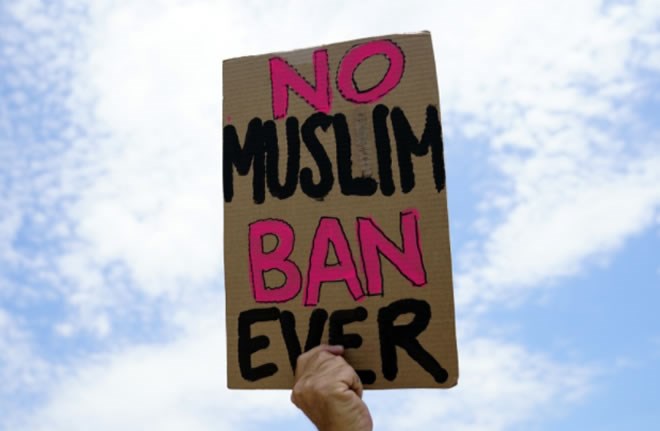
A protester holds up a sign outside the the Supreme Court in Washington on June 26, 2018, as part of a demonstration against the court’s ruling upholding President Trump’s travel ban on several Muslim-majority countries.(Carolyn Kaster / Associated Press)
President Biden, in one of his first moves in office, reversed the immigration restriction put in place by the Trump administration covering five Muslim-majority nations — Iran, Libya, Somalia, Syria and Yemen — as well as North Korea and some government officials from Venezuela.The Trump administration was forced to revise its original order twice to resolve legal problems over due process, implementation and exclusive targeting of Muslim nations.
Jake Sullivan, who will be Biden’s national security advisor, said the ban “was nothing less than a stain on our nation. It was rooted in xenophobia and religious animus.”
Biden also extended to June 2022 temporary legal status for Liberians who fled civil war and the Ebola outbreak.
Biden sent a broader immigration plan to Congress on Wednesday that includes a pathway to U.S. citizenship for an estimated 11 million people.
The bill also proposes an expansion of refugee admissions and increases in per-country visa caps.
Lund Horn Africa Conferences reports
Ulf Johansson Dahre (ed.)
Predicaments in
the Horn of Africa
10 Years of SIRC Conferences
in Lund on the Horn of Africa
DEPARTMENT OF ECONOMIC HISTORY,
DEPARTMENT OF SOCIOLOGY/SOCIAL ANTHROPOLOGY,
DEPARTMENT OF POLITICAL SIENCE, LUND UNIVERSITY
SOMALIA INTERNATIONAL REHABILITATION CENTRE (SIRC)
LUND HORN OF AFRICA FORUM (LUHAF)
_____________________________________________________
Scholars, university students, civil society organizations, Horn of Africa region can benefit from Lund Horn of Africa conferences by clinking www.sirclund.se, then clink reports, for free.
Death toll from violence in Sudan’s West Darfur rises to 83
Death toll from violence in Sudan’s West Darfur rises to 83
Source: AP, By SAMY MAGDY, 17 January 2021

Map locates West Darfur
CAIRO (AP) — The death toll from tribal violence between Arabs and non-Arabs in Sudan’s West Darfur province climbed to at least 83, including women and children, a doctor’s union and aid worker said, as sporadic violence continued Sunday.
The deadly clashes grew out of a fistfight Friday between two people in a camp for displaced people in Genena, the provincial capital. An Arab man was stabbed to death and his family, from the Arab Rizeigat tribe, attacked the people in the Krinding camp and other areas Saturday.ADVERTISEMENT
Among the dead was a U.S. citizen. Saeed Baraka, 36, from Atlanta, had arrived in Sudan less than two months ago to visit his family in Darfur, his wife, Safiya Mohammed, told The Associated Press over the phone.
The father of three children rushed to relieve a neighbor amid the clashes in the Jabal village in West Darfur, when he was shot in his head Saturday, his brother-in-law Juma Salih said.
Baraka’s wife said the U.S. embassy in Khartoum phoned her to offer condolences. The embassy did not return phone calls and emails from the AP seeking comment.
The violence led to local authorities imposing a round-the-clock curfew on the entire province. Besides the 83 killed, at least 160 others were wounded, according to Sudan’s doctors’ committee in West Darfur. It said there were troops among the wounded.
It said clashes subsided by midday on Sunday and the security situation started to improve.
The committee is part of the Sudanese Professionals Association, which spearheaded a popular uprising that eventually led to the military’s ouster of longtime autocratic president Omar al-Bashir in April 2019.
The clashes pose a challenge to efforts by Sudan’s transitional government to end decades-long rebellions in areas like Darfur, where most people live in camps for the displaced and refugees.
Sudan is on a fragile path to democracy and is being ruled by a joint military-civilian government.
That bout of violence came two weeks after the U.N. Security Council ended the joint U.N.-African Union peacekeeping force’s mandate in the region. The UNAMID force, established in 2007, is expected to complete its withdrawal by June 30.
It also puts into question the transitional government’s ability to stabilize the conflict-ravaged Darfur region.
Salah Saleh, a physician and former medical director at the main hospital in Genena, said clashes renewed Sunday morning at the Abu Zar camp for internally displaced people, south of the provincial capital.
He said most of the victims were shot dead, or suffered gunshot wounds.
Adam Regal, a spokesman for a local organization that helps run refugee camps in Darfur, said there were overnight attacks on Krinding. He shared footage showing properties burned to the ground, and wounded people on stretchers and in hospital beds.
Authorities in West Darfur imposed a curfew beginning Saturday that includes the closing of all markets and a ban on public gatherings. The central government in Khartoum also said Saturday a high-ranking delegation, chaired by the country’s top prosecutor, was heading to the province to help re-establish order.
A database by the U.N. Office for the Coordination of Humanitarian Affairs, OCHA, showed that inter-communal violence across Darfur region doubled in the second half of 2020, with at least 28 incidents compared to 15 between July and December 2019.
West Darfur province experienced a “significant increase” of violence last year, with half of the 40 incidents reported in the entire Darfur region, OCHA said Sunday
Global Peace Index 2020
Global Peace Index 2020 – Vision of Humanitywww.visionofhumanity.org › resources › global-peace-in…PDFGlobal Peace Index 2020: Measuring Peace in a Complex World, Sydney,. June 2020. Available from: http://visionofhumanity.org/reports (accessed Date Month .
Biden to rescind ban on Somalis upon swearing-in: White House Chief of Staff
Biden to rescind ban on Somalis upon swearing-in: White House Chief of Staff1




Source: Hiiraan Online, Sunday January 17, 2021
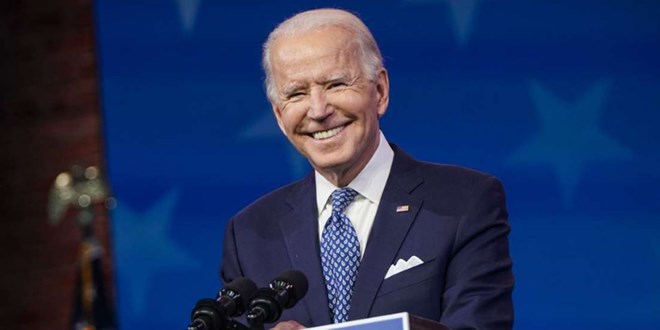
WASHINGTON (HOL) – President-elect Joe Biden will immediately revoke Trump’s order banning travellers from Muslim majority countries on his first day in office, US media reports.
According to Biden advisors quoted by US media, Biden will, upon being sworn into office rescind the ban which has subjected thousands of travellers from countries such as Somalia to restrictions including entry into the United States.
“These actions will change the course of COVID-19, combat climate change, promote racial equity and support other underserved communities, and rebuild our economy in ways that strengthen the backbone of this country: the working men and women who built our nation,” White House Chief of Staff Ron Klain wrote in a memo to new White House staff.5President Trump issued the first order restricting travel to the US by nationals of Muslim majority countries in January 2017.
Although the courts blocked most sections of the Executive Order, the Supreme Court upheld the third order (Presidential Proclamation 9645) in June 2018 retaining the ban on travellers from countries including Somalia.
The revocation of the order will be a major boon for Somalis who have been cut off from their families since the first order came into force in 2017.
Impact of Ethiopian Crisis on Somalia
Impact of Ethiopian Crisis on Somalia
Sourc e: World Politics Review published on 15 January 2021 an analysis titled “Will Somalia Be Collateral Damage of Ethiopia’s Conflict?” by Peter Kirechu.
The author comments that the conflict in Tigray Region of Ethiopia exacerbates problems in Somalia and has resulted in the removal from Somalia of some Ethiopian troops. This does not bode well for Somalia. 0 commentsLabels: Abiy Ahmed, al-Shabaab, conflict, elections, Ethiopia, Kenya, Mohamed Abdullahi Farmajo, Somalia, Tigray Region, TPLF, US
Ethiopian Crisis Threatens Wider Region
Ethiopian Crisis Threatens Wider Region
Source: The United States Institute of Peace (USIP) reprinted on 13 January 2021 a commentary titled “Ethiopia’s Worsening Crisis Threatens Regional, Middle East Security” by Payton Knopf, USIP, and Jeffrey Feltman, Brookings.
The authors argue that Ethiopia’s escalating internal crises pose an increasingly grave threat not only to the country’s citizens but to international peace and security and to the interests of the United States and its partners in the Middle East. 0 commentsLabels: Abiy Ahmed, Amhara, Benishangul-Gumuz, Egypt, Eritrea, Ethiopia, Gulf States, Horn of Africa, Middle East, Oromo, refugees, Tigray Region, US
British Army trains 500th Somali soldier in infantry skills
British Army trains 500th Somali soldier in infantry skills




Source:GOV.UK, Saturday January 16, 2021
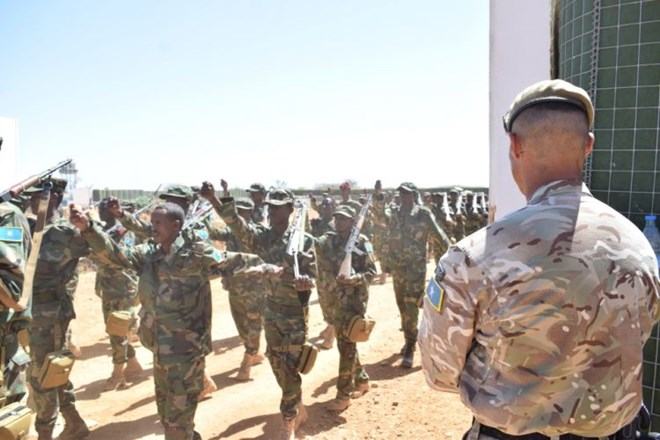
Soldiers and officers from 8 Brigade, Somalia National Army marching past a UK instructor during their graduation ceremony in Baidoa, Somalia (Picture: MOD).
The British Army has trained its 500th Somali soldier in the essential infantry skills they need to combat armed groups and ensure security and stability in the country. The latest batch of 113 troops marked the end of their training with a ceremony in Baidoa, Somalia on 31 December.
The eight-week Company Collective Training course is designed to prepare officers and soldiers from the Somali National Army (SNA) to conduct security operations in the country’s South West State, countering the threat from Al-Shabaab and other jihadist and criminal organisations. The 26-man British training team from 2nd Battalion, Princess of Wales’s Royal Regiment taught students skills including marksmanship, patrolling, medical aid and counter improvised explosive device (IED) techniques.
On completion of the course, soldiers were provided with uniforms and equipment which, when combined with their training, will allow them to operate much more effectively. The contingent are the fifth Somali company trained by Britain since the course was rolled out in the country in September 2019. The UK has also provided the SNA with military vehicles to support security operations and a new barracks in Baidoa that can accommodate 450 troops.Minister for the Armed Forces James Heappey said:
“This milestone shows Britain’s ongoing commitment to help Somalia provide security and stability for its people, while combating terrorist groups that threaten the UK’s interests at home and abroad.
The United Kingdom and our Armed Forces will continue to support Somalia, with plans to double the number of troops trained under this scheme in 2021.”
Ben Fender OBE, British Ambassador to Somalia, said:
“The UK remains fully committed to training the Somali National Army in Baidoa. In September, we ran a course for headquarters staff in how to plan and run operations, and this week are graduating another infantry company (of 113 soldiers). We expect to train a new company around every eight weeks next year, and to complete our training of 8 Brigade by the end of 2021”.
The graduation ceremony was attended by Brigadier General Mohammed Sheik Irow, Commander of SNA 60 Sector, and Lt Col Andy Wareing. Following a parade and speeches, the two officers inspected the graduating soldiers and presented individual awards.
Lt Col Andy Wareing, SNA Training and Advisory Team (STAT) Commander, said:
“I congratulate the soldiers from 60 Sector stood here today. They displayed impressive professionalism and commitment during eight weeks of tough training and are well prepared for the challenges that lay ahead.
I would also like to thank their Somali and British instructors, whose relentless pursuit of excellence set a fine example to the soldiers. We look forward to the next Company Collective Training course which starts in January 2021.”
The milestone graduation of the 500th soldier from the course underlines the UK’s commitment to Somalia’s longer-term security, with plans to train five more companies comprising around 600 troops in 2021.
Over 1,750 officers and soldiers have attended various military courses at the British-funded training centre in Baidoa.
It follows an announcement in September 2020 that the British Army had trained the first Brigade Headquarters for a generation in Somalia. A total of 19 SNA officers attended the course – adapted to ensure it could take place in accordance with COVID force health protection measures – which covered planning and delivery of stabilisation operations and prepared the officers to work alongside international partners to deliver security for the Somali people.
Lt Ibrahim Madkus Abdurahman of SNA 60 Sector, said:
“The Brigade Staff Course gave me the tools to plan operations, and the Company Collective Training course gives our soldiers the skills to conduct those operations.
The UK Minister for Africa, James Duddridge MP, recently underlined Britain’s continued commitment to Somalia with a new support package worth £21.8 million. The package included £1.6 million to counter the threat from roadside bombs, and a further £3.37 million for the Somali Security Forces engaged in joint operations with the African Union Mission to Somalia (AMISOM).”
From: Ministry of Defence, Foreign, Commonwealth & Development Office, James Duddridge MP, and James Heappey MP
International maritime bureau urges vigilance on piracy off coast of Somalia

International maritime bureau urges vigilance on piracy off coast of Somalia




Source: XINHUA, Thursday January 14, 2021
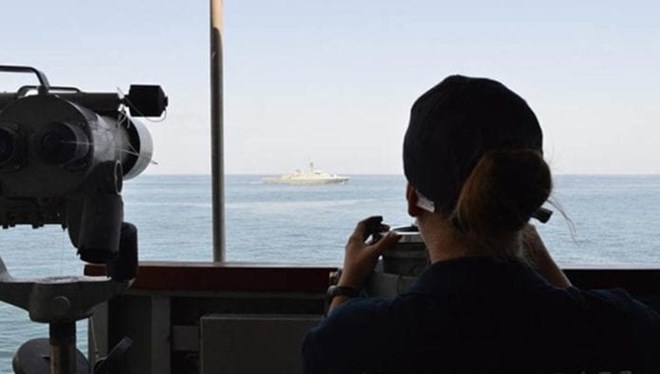
On patrol: a security exercise at sea.
A global maritime body on Wednesday called on foreign vessels to remain vigilant as they transit the Arabian Sea and the Gulf of Aden, saying despite the fall in piracy off the coast of Somalia, danger persists in the Gulf of Guinea.
The latest report by the International Chamber of Commerce’s International Maritime Bureau (IMB) said there were no reported piracy attacks in 2019 and 2020.
In 2018, IMB said three vessels have reported being fired upon in this region including the Red Sea, Gulf of Aden, Somalia, Arabian Sea and the Indian Ocean.
“Although the opportunity for incidents has reduced, the Somali pirates continue to possess the capability and capacity to carry out incidents,” IMB said in its annual piracy report, saying that threat still exists in the waters off the southern Red Sea, Gulf of Aden including Yemen and the northern Somali coast, Arabian sea, Gulf of Oman and off the eastern and southern Somali coast.In the past, vessels have been attacked off Kenya, Tanzania, Seychelles, Madagascar, and Mozambique as well as in the Indian Ocean and off the west and south coasts of India and west Maldives.
According to IMB, Somali pirates tend to be well armed with automatic weapons, rocket propelled grenades and sometimes use skiffs launched from mother vessels, which may be hijacked fishing vessels or dhows.
Analysts say the drop in piracy incidents is however a relief to shipping companies using the Indian Ocean that had in previous years been the target of pirates, often paying heavy ransom to secure release of their vehicles and the crew.
Meanwhile, 135 crew were kidnapped from their vessels in 2020 globally, with the Gulf of Guinea accounting for over 95 percent of crew numbers kidnapped, the report says.
According to the report, a record 130 crew members were kidnapped in 22 separate incidents.
“Since 2019, the Gulf of Guinea has experienced an unprecedented rise in the number of multiple crew kidnappings. In the last quarter of 2019 alone, the Gulf of Guinea recorded 39 crew kidnapped in two separate incidents,” IMB said.
Incidents in the Gulf of Guinea are particularly dangerous as over 80 percent of attackers were armed with guns, according to the report.
“All three vessel hijackings and nine of the 11 vessels fired upon in 2020 related to this region. Crew kidnappings were reported in 25 percent of vessel attacks in the Gulf of Guinea – more than any other region in the world,” said IMB.

